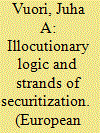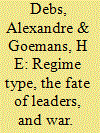| Srl | Item |
| 1 |
ID:
080891


|
|
|
|
|
| Publication |
2008.
|
| Summary/Abstract |
Convincing research programmes often use a variety of data from cases in different contexts; in order to reach a wider understanding, the models and hypothesis of securitization studies have to be applied to broad groups of cases. The research programme of securitization studies is formed around the leading idea of securitization being a social process achieved through speech acts. I argue that by explicating the concept of securitization through illocutionary logic, it can be utilized to study security politics in non-democratic contexts in addition to the favoured liberal democratic one, where the majority of empirical analysis has been conducted so far. In addition, I present clarifications to the concepts of 'audiences' and 'special politics' used in the theory. The theoretical discussion is illustrated with examples from the Chinese political system
|
|
|
|
|
|
|
|
|
|
|
|
|
|
|
|
| 2 |
ID:
100764


|
|
|
|
|
| Publication |
2010.
|
| Summary/Abstract |
We propose and test a formal model of war and domestic politics, building on recent evidence on the relationship between regime type, the effect of war on the probability of losing office, and the consequences of losing office. The less the outcome of international interaction affects a leader's tenure and the less punitive are the consequences of losing office, the more a leader is willing to make concessions to strike a peaceful bargain. We demonstrate that our theory successfully predicts war involvement among nondemocratic regime types. Moreover, our theory offers an intuitive explanation for the democratic peace. Compared to nondemocratic leaders, the tenure of democratic leaders depends relatively little on the war outcome, and democratic leaders fare relatively well after losing office. Thus, democratic leaders should be more willing and able to avoid war, especially with other democrats.
|
|
|
|
|
|
|
|
|
|
|
|
|
|
|
|